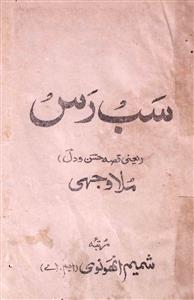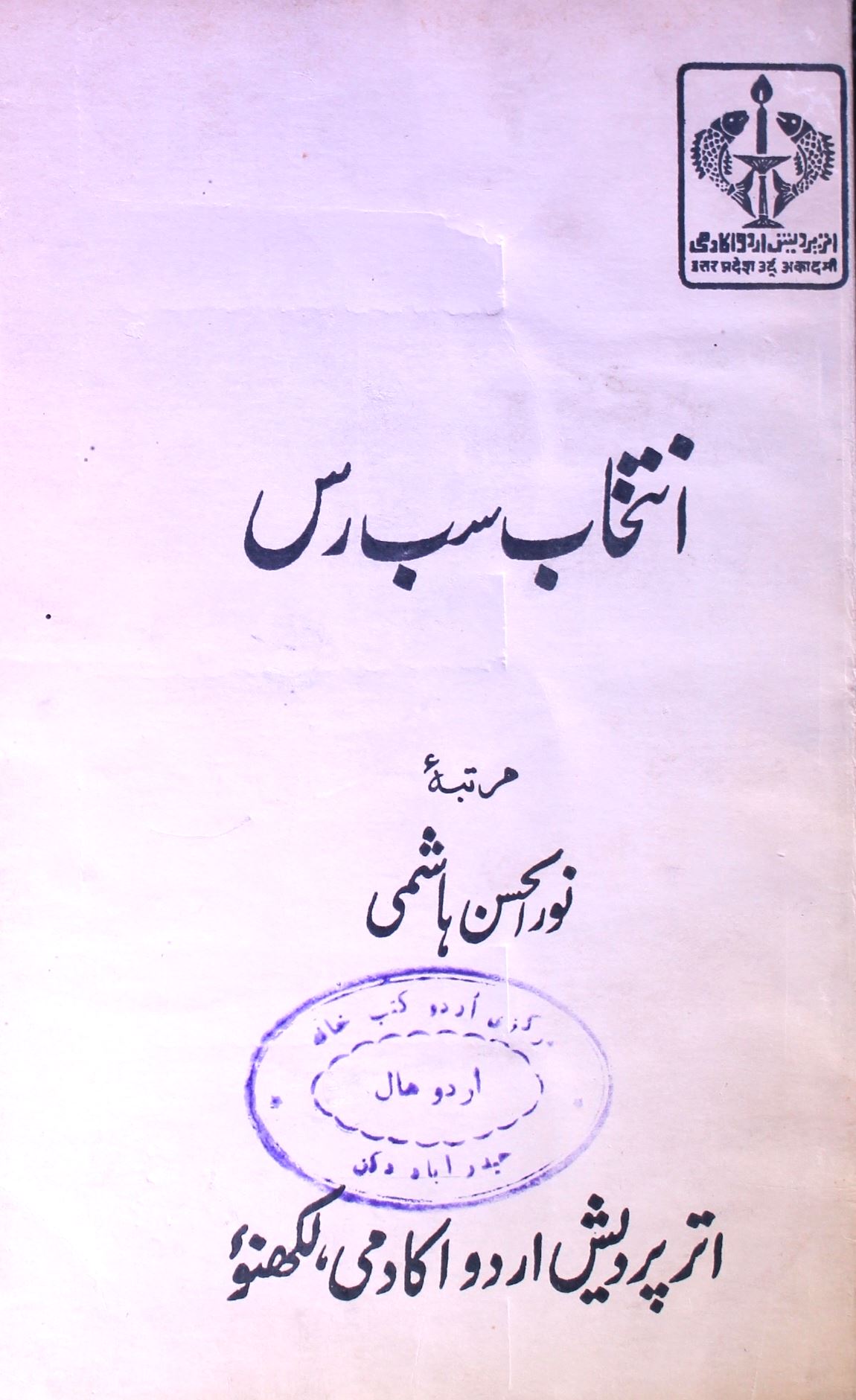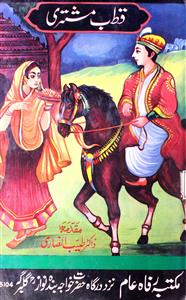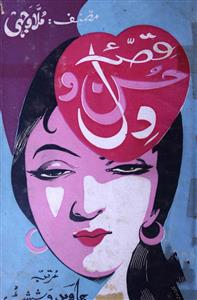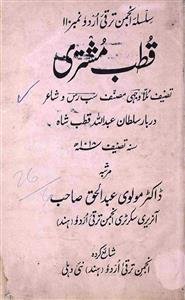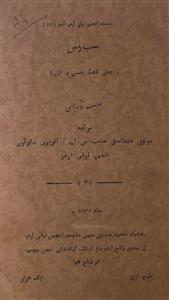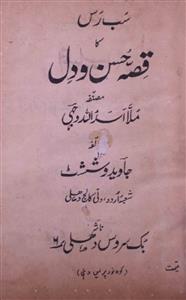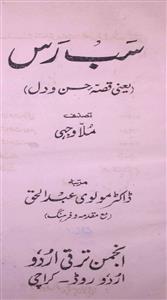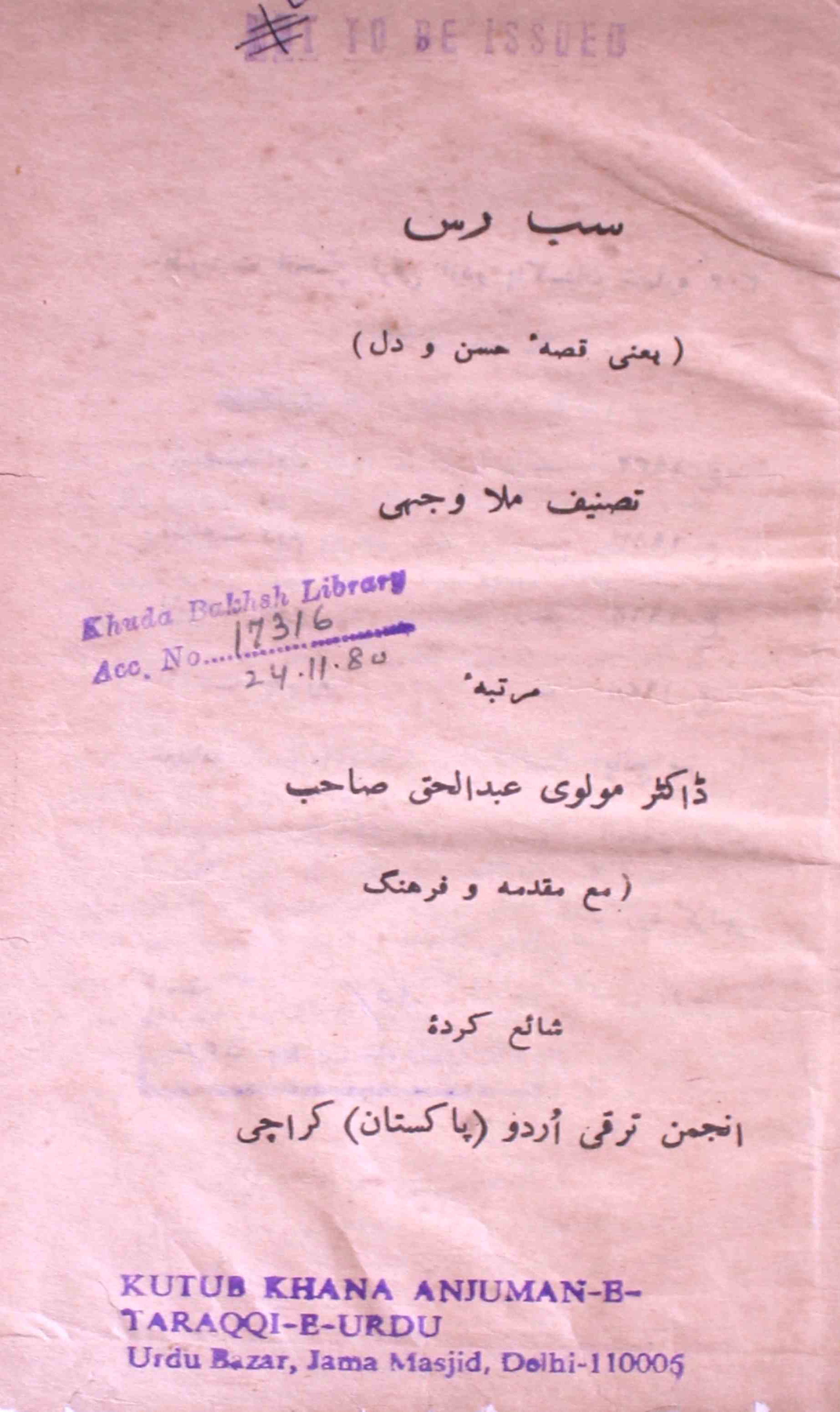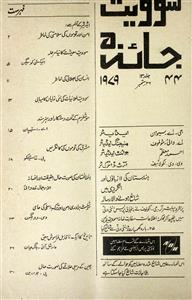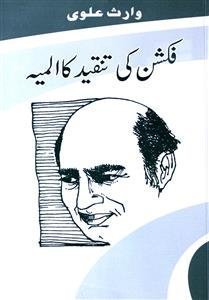 For any query/comment related to this ebook, please contact us at haidar.ali@rekhta.org
For any query/comment related to this ebook, please contact us at haidar.ali@rekhta.org
About The Book
"سب رس" ملا وجہی کی کتا ب ہے جسے اردو کی پہلی نثری کتاب ہونے کا بھی شرف حاصل ہے۔وجہی نے اپنی کتاب کو تمثیلی انداز میں بیان کیا ہے۔ ان کی کتاب اردو کی پہلی کتاب کے طور پر جانی جاتی ہے۔ یہ کتاب دکن میں قطب شاہی عہد میں لکھی گئی۔ وجہی اس کی زبان کو ہندوستانی زبان کہہ کر یاد کرتا ہے ۔ کتاب کی زبان اپنے عہد کی عکاسی کرتی ہے۔ اگرچہ بعض جگہ پر وہ دکنی اور ہندی، فارسی، عربی،سنسکرت کے الفاظ بھی استعمال کرتا ہے۔ اپنے زمانے میں اس کی یہ کتاب بہت ہی خوصورت نثر کا نمونہ سمجھی جاتی تھی۔ اسلئے آج کے اعتبار سے جو اس کتاب میں نقص پایا جاتا ہے، وہ مرور زمانہ اور زبان کی ترقی کی وجہ سے ہے، ناکہ کتاب کی خامی کی وجہ سے ۔ وجہی نے اس کتاب میں تمثیلی انداز میں حسن و عشق کی داستان کو بیا ن کیا ہے ۔ بہت سے لوگ وجہی کو اردو انشائیہ نگاری کا باوا آدم قرار دیتے ہیں ۔ وجہی نے اس فرضی داستان میں جگہ جگہ صوفیانہ خیالات ، مذہبی روایات اور اخلاقی تعلیمات کی تیغوگ کی ہے ۔ وجہی کی یہ کتاب کلاسیکی نثر کا بہترین نمونہ ہے۔ اس نسخہ کو شمیم انہونوی نے مرتب کیا ہے۔ مقدمہ میں کتاب کی زبان و بیان وغیرہ پر تفصیل سے بات کی ہے۔ نیز آسان اور رائج زبان میں قصہ کا خلاصہ بھی پیش کردیا ہے۔
About The Author
Mulla Wajhi is one of the famous poets of Deccan who has tried his hand at all genres of Deccan language and has made a clear place for himself in poetry. He strengthened the foundations of the language in such a way that for almost two and a half centuries his poetry was loved and valued in the literary circles of the Deccan. Mulla Wajhi has shown the power of his pen not only in poetry but also in prose.
Mulla Wajhi was born during the reign of Sultan Ibrahim Qutb Shah of Golkonda. It is said that his ancestors came from Deccan from Khurasan and are living here. He loved his homeland very much. He was educated by qualified teachers. When Muhammad Qali Qutb Shah succeeded to the throne after Ibrahim Qutb Shah, he succeeded in the court of Mulla Wajhi and due to his ability and knowledge he got the status of the poet laureate. Other poets associated with this court, did not receive such honors. It is recorded in biographies that Wajhi was quite proud of his status.
But this arrogance of Wajhi ended when Qali Qutb Shah died and Muhammad Qutb Shah ascended the throne, and Mir Momin took his place who was a pious, devout ruler. He did not spend time in works like poetry but was engaged in divine worship. A great monument of his piety is the Mecca Mosque in Hyderabad. During his tenure, Wajhi had to live a life of hardship and anonymity. Then, after the untimely demise of Muhammad Qutb Shah, when Abdullah Qutb Shah took over the government, Wajhi’s time came again, as the Sultan himself summoned Wajhi and exalted him with honor and dignity.
The book "Sab-Ras" is a prose work of Mullah Wajhi. In this book, the issues of ethics and mysticism are described very well in the form of a story. Ethical issues are discussed which are very important in a person's mental and social life. The attributes by which man is called man have been openly discussed. For example, it is necessary for man to have intellect, in the absence of which his movements become worse than those of animals.
In his prose, compound and mixed sentences are almost non-existent and all the arguments have been made in simple single lines. That is why "Sab-Ras" can still be easily read and understood today. Wajhi's "Qutub Mushtari" is an important Masnavi in Urdu literature which was written in 1609. Muhammad Quli Qutub Shah was in love with a dancer Bhag Mati. It is said that his story is the subject of this Masnavi in which Bhagwati is mentioned by the name of Jupiter. This Masnavi was completed in only twenty days because Bhagwati's death anniversary was approaching and he wanted to please the king by presenting this Masnavi on this occasion so that he could be rewarded and honored. The Masnavi traditionally begins with the praise of God, followed by the Naat of the Prophet, then Manqabat Ali, and then love. Then is it explained what qualities a good poem should have, such as the need for fluency in a poem.
The story of the original Masnavi is that after evil intentions, a son of King Ibrahim was born. Astrologers predicted his lucky life. The boy was so promising that after only twenty days of education in the school, he became a scholar, poet and calligrapher. When he was young, he became the epitome of wrath and the power of evil. He once saw a beautiful woman in a dream and fell in love with her. At the king's urging, many beauties tried to seduce him, but to no avail. Finally, an artist named Zohra was called who had pictures of many beautiful girls. He showed the picture of Mushtari to the prince who recognized her as soon as he saw it. Then the prince, disguised as a merchant, set out for Bengal with Zuhra, the sister of Mushtar. Along the way, they encountered giants, snakes, dragons, and monsters, but the prince overpowered them all. Also in captivity of the demons was Aleppo's Wazirzada Mirrikh Khan, who was in love with Mushtar's sister Zohra. Finally, Prince Qutub Shah and Mushtari traveled long distances to Deccan where they got married in a big way. Ibrahim Shah had become weak, so he gave the throne of the kingdom to his son and became a recluse. Thus ended the story of the names of the celestial planets. Reading this story, it seems that it is an invention of the mind of the cause itself. Although its story is similar to the traditions of Muhammad Qali Qutb Shah and Bhagmati, but for the story of Zeba, it is so distorted that neither the form of the lover nor the form of the beloved is recognized. Therefore, some scholars suspected that this was just another story which had nothing to do with the Sultan.
Like Wajhi’s year of birth, there is no definite information about his death. It is estimated thathe died between 1665 and 1672, leaving behind masterpieces that are still revered. Mullah Wajhi has also recited obituaries which were recited in mourning ceremonies of that time. One of his Marsiya was very popular and read:
Hussain ka Gham karo Aziizaa.n
Nain se Anjho Jharo Aziizaa.n
 For any query/comment related to this ebook, please contact us at haidar.ali@rekhta.org
For any query/comment related to this ebook, please contact us at haidar.ali@rekhta.org
